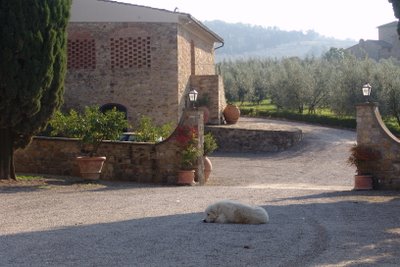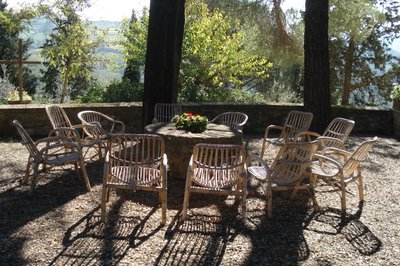19. The Intuitive Nature of Grief
 Mario has just returned from a two-week trip to Italy – business, but hey, how bad can ANY business trip to Italy be? – and something has shifted. Instead of flooding into his space with my needs, I have felt compelled to just enjoy his company and do whatever I can to make his landing in the home time-zone soft and comfortable.
Mario has just returned from a two-week trip to Italy – business, but hey, how bad can ANY business trip to Italy be? – and something has shifted. Instead of flooding into his space with my needs, I have felt compelled to just enjoy his company and do whatever I can to make his landing in the home time-zone soft and comfortable.Mario dislikes those posts on touching Gregory’s body. Creeps him out, he says. It's too personal to share, he says.
I can see how it would be inappropriate for him. Although outgoing, Mario’s also a very private person and even now shares only glimpses of the day-to-day challenges of dealing with Isabel’s illness.
Grieving isn’t and shouldn’t be one-size-fits-all. Elisabeth Kubler-Ross gives insight into this in her final book, On Grief and Grieving, co-written with David Kessler. She talks about the need to share grief, the sometimes surprising ways it manifests – a man who lost his son wanted to immediately make love to his wife, not out of carnal escape but to reaffirm life – and the necessity of surrendering to it.
Not long before Mario left for Italy, a dear friend of his, now a friend of mine, lost her husband of 53 years to Alzheimer’s. Violet worked with Isabel, and when Isabel was ill, Violet was there to help, most memorably, I’m told, by reading to Isabel when she could no longer read for herself.
Violet’s husband Angelo had been a graphic designer in New York City during the 1950s and ‘60s, a golden age of creativity in that field. New York was the nerve center. By the time Angelo died earlier this year, the memory of his heyday, his later work with shadow boxes, his love of Mexican art, indeed of Violet and all they had lived through together, had been scrubbed from his mind.
During the later throes of the disease, when he and Violet were at home, he once looked at her said, “Do you work here?” Violet answered, “Yes, I do.” He thought about this for a moment, then said, “Do you think you could get me a job here, too?” Funny, yes. But funny-sad.
While Mario was in Italy, Violet insisted on hosting a remembrance gathering of friends and family. She both looked forward to the day and dreaded it. She suspected that it would be emotionally exhausting. Yet intuitively, she knew it was a necessary element of her grieving.
 Each of their children spoke movingly of their father and mother. Violet read a piece that she had written about him, her voice faltering toward the end.
Each of their children spoke movingly of their father and mother. Violet read a piece that she had written about him, her voice faltering toward the end.There was Violet’s sister, who recalled when Violet and Angelo had their first date in 1952. And Angelo’s teary-eyed golf buddies. One said, “We still haven’t replaced him in our foursome.”
And his caregiver for what turned out to be the final year. The young woman marveled at Violet and Angelo’s relationship, at Violet’s caring and insistence that Angelo be washed, groomed and dressed every day and treated with the dignity befitting the man he had been, even when he did not know who he was, where he was or how to dress himself. It was, the young woman said, an inspiration.
There were toasts. And tears. Stories and laughter. And when it was all done, Violet felt complete with another step in her passage.
 Grief is like entering into a long, dark tunnel. Dark because it is unspeakably painful. Dark because you don’t know what’s ahead. Dark because it fits your mood. When I first met Mario, I told him that he was in the tunnel. I think he also told Violet this. Grief does feel like a long, black tunnel. And part of the value of sharing with others who have experienced it is their assurance of light up ahead, even if the person who is grieving cannot yet see it.
Grief is like entering into a long, dark tunnel. Dark because it is unspeakably painful. Dark because you don’t know what’s ahead. Dark because it fits your mood. When I first met Mario, I told him that he was in the tunnel. I think he also told Violet this. Grief does feel like a long, black tunnel. And part of the value of sharing with others who have experienced it is their assurance of light up ahead, even if the person who is grieving cannot yet see it.But like a tunnel, there are no shortcuts. You may spend time groping along the edges for another, shorter way out. But in the end, the quickest way out is still through.


0 Comments:
Post a Comment
<< Home